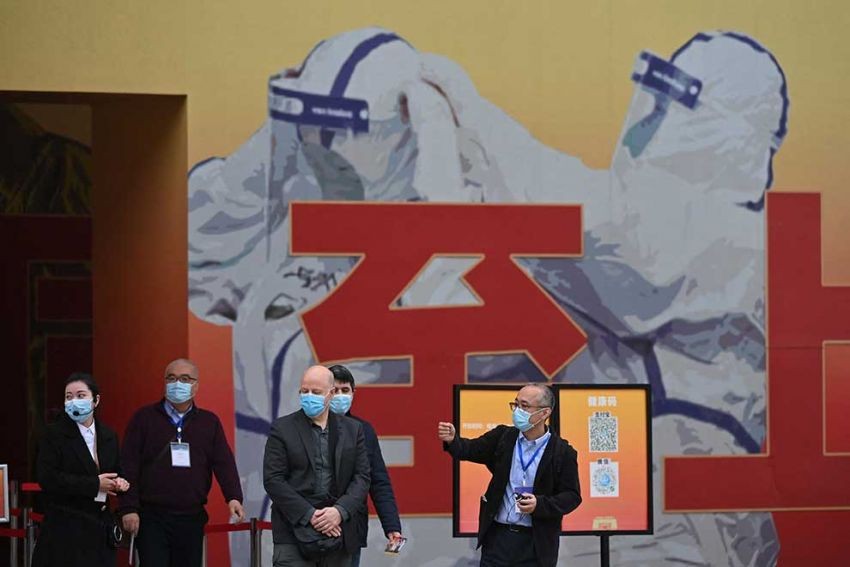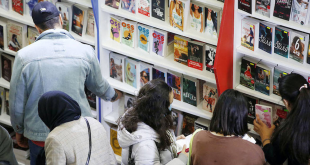By Kin Phea

Members of the World Health Organisation (WHO) team investigating the origins of the Covid-19 pandemic leave after visiting a museum exhibition about China’s fight against Covid-19 in Wuhan, China’s central Hubei province, on January 30. AFP
Covid-19 origin tracing is serious scientific issue and the joint studies of the origins of the pandemic are very important to better prevent future risks. It should be made in other secretive bases and biological laboratories all over the world where the early case of Covid-19 was found. China should not be the only target, and the virus origin tracing issue must not be politicised.
Since the outbreak of the Covid-19 pandemic, the blame game and finger-pointing concerning the origin of the virus have been targeted at China, creating hatred of and discrimination against Chinese and Asian people residing in some Western countries. Former US President Donald Trump once called Covid-19 the China virus.
From the beginning, the US failed to respond to the pandemic, ignoring the hard work of scientists and used intelligence means to carry out the so-called origin-tracing, hyping the “lab leak theory”, and tried to politicise the pandemic, stigmatise the virus and use origin-tracing as a tool. The lab leak theory was propagated by Trump last year.
In February 2021, a joint expert team made up of officials from China and the World Health Organisation (WHO) visited the Wuhan Institute of Virology and had in-depth and candid exchanges with experts there. Members of the joint expert team spoke highly of the institute’s openness and transparency, and reached a major conclusion in the joint study report that the allegation of lab leaking is extremely unlikely.
However, on May 26, US President Joe Biden ordered the US intelligence agencies to further probe the origins of Covid-19. In his statement, Biden stressed that the US will also keep working with like-minded partners around the world to press China to participate in a full, transparent, evidence-based international investigation and to provide access to all relevant data and evidence.
The US called for WHO to carry out a second phase of its investigation into the origins of the coronavirus, with independent experts given full access to original data and samples in China asserting that Phase one of the WHO-convened Covid-19 origins study was always meant to be the beginning of the process, not the end.
In response, China, through remarks by a representative at its embassy in the US, said it supported a comprehensive study of all early cases of Covid-19 found worldwide and a thorough investigation into some secretive bases and biological laboratories all over the world.
Since the outbreak of the Covid-19 pandemic, after making painstaking efforts, China has managed to bring the epidemic under control. Meanwhile, China actively participates in international anti-epidemic cooperation to help countries around the world overcome the epidemic, providing assistance to all parties to be best of its ability.
With a scientific, professional, serious and responsible attitude in tracing the origins of the virus, China has been cooperatively working with the WHO in global origin-tracing. Based on openness, evidence and transparency, it is suggested that factors including cold-chain supply and a candidate intermediate host species should be considered and focused in the next phase of origin tracing cooperation expected to be undertaken in multiple locations around the globe.
It’s reasonable for all parties to respect facts and science, and jointly reject political manipulation of vilification under the pretext of origin-tracing, so as to create a favorable environment for global cooperation in origin-tracing and solidarity in fighting the epidemic.
WHO’s plan for the second phase of studies into the origins of Covid-19 was put forward unilaterally by the WHO Secretariat without getting the approval of all member states. As of now, 70 countries have voiced opposition to politicising origin-tracing and emphasised the importance of upholding the joint China-WHO study report by sending letters and issuing statements to the WHO director-general.
On August 2, over 300 political parties, social societies and think tanks in over 100 countries and districts opposed politicising virus origin-tracing in a joint statement sent to the WHO Secretariat. It shows that clear-eyed people over the world can tell right and wrong.
Now, it’s time for the international community to make joint efforts and concrete actions to fight the Covid-19 pandemic. It’s not appropriate for one country to blame a certain one for the virus origin. The pandemic has no boundary and discriminates no one, so it’s crucial for all countries to work together closely to overcome this hard time based on the principle of multilateralism.
Dealing with the havoc in the region and the world caused by Covid-19 is not the responsibility of any single country. Collective efforts, actions and measures are vital to effectively fight this pandemic and to achieve socio-economic recovery as well as enhance partnership for sustainable and inclusive development.
It should be noted that China has played an important role in the efforts to fight Covid-19 and in helping other countries rebuild their economies during the pandemic. We hope that the least developed countries will equitably receive more vaccines through humanitarian assistance from China and the WHO-led Covax Facility by putting human life ahead of political motivation.
Covid-19 vaccines should be public goods that are accessible to all nations. Vaccine rollout should not be politically motivated, intermixed with conspiracy theories. As argued by Chinese State Councilor and Foreign Minister Wang Yi, the origin-tracing should not be manipulated by politics, and should not be used to blame a certain country, let alone splitting the international community. Only when we unite can we truly defeat the virus.
Kin Phea is director-general of the International Relations Institute at the Royal Academy of Cambodia.
m.phnompenhpost.com
 Africa -China Review Africa -China Cooperation and Transformation
Africa -China Review Africa -China Cooperation and Transformation
